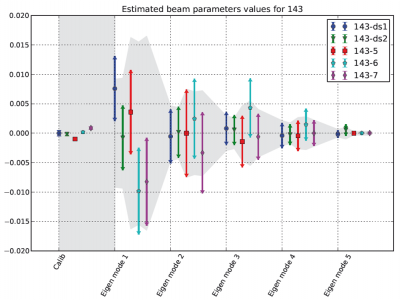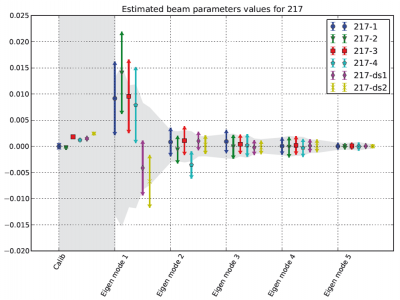Difference between revisions of "Power spectra"
m (→Intra-frequency checks) |
m (→Intra-frequency checks) |
||
| Line 5: | Line 5: | ||
==Intra-frequency checks== | ==Intra-frequency checks== | ||
| − | These compare the power spectra between various detector sets operating within the same frequency channel. | + | These compare the power spectra between various detector sets operating within the same frequency channel. They see the same sky, and should therefore give consistent results, up to the noise level, and up to color corrections due to their somewhat different spectral band passes. These corrections are rather small if one restricts the comparison to specific portions of the sky, for instance dominated by extra-Galactic components, like it is done for extracting the CMB power spectrum in the likelihood analysis where $f_{sky} \sim 0.4$. |
| + | |||
| + | <gallery caption="Consistency checks" widths="400px" heights="300px"> | ||
| + | File:PS143.png | 143 GHz detector sets | ||
| + | File:PS217.png | 217 GHz detector sets | ||
| + | </gallery> | ||
| + | |||
| + | The pictures shows in grey the prior deduced from the beam paramaters uncertainty analysis. At 217 GHz, the distance between PSB and SWB suggests an accounted for effect (fortunately small enough for the likelihood analysis). The relative calibration appear to be at the 0.1% level. | ||
| + | |||
| + | Thi shows that whatever systematic effect might remain, it has to be common to all detectors within a frequency band to a very high level of acuracy. | ||
==Best-fit frequency spectra== | ==Best-fit frequency spectra== | ||
==Inter-frequency checks== | ==Inter-frequency checks== | ||
Revision as of 20:39, 21 October 2012
This is the page regarding the HFI-based power spectra
We call intra-frequency checks those performed between detectors (or sets of) in the same frequency bands, which thus respond similarly to the sky emission. Interfrequency-checks on the other hand correspond to checks bewteen detector in different frequency bands, imposing further reliance on a sky model to perform the test.
Intra-frequency checks[edit]
These compare the power spectra between various detector sets operating within the same frequency channel. They see the same sky, and should therefore give consistent results, up to the noise level, and up to color corrections due to their somewhat different spectral band passes. These corrections are rather small if one restricts the comparison to specific portions of the sky, for instance dominated by extra-Galactic components, like it is done for extracting the CMB power spectrum in the likelihood analysis where $f_{sky} \sim 0.4$.
- Consistency checks
The pictures shows in grey the prior deduced from the beam paramaters uncertainty analysis. At 217 GHz, the distance between PSB and SWB suggests an accounted for effect (fortunately small enough for the likelihood analysis). The relative calibration appear to be at the 0.1% level.
Thi shows that whatever systematic effect might remain, it has to be common to all detectors within a frequency band to a very high level of acuracy.
Best-fit frequency spectra[edit]
Inter-frequency checks[edit]
(Planck) High Frequency Instrument
Cosmic Microwave background

